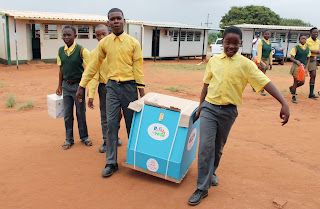Tuesday, 17 March 2020
Rally to Read shows children the road to comprehension
The Rally to Read 2020 Mpumalanga event, held over the past weekend, again showed that when Ford and the Rally to Read teams arrive at a rural school, the reception is vibrant, colorful, energetic, loud and in your face.
Boasting excellent CSI and service delivery stats, Westvaal Numbi Ford and Westvaal Numbi Ford Hazyview were chosen by Ford SA to support the Mpumalanga leg of this national initiative. It was also their second year of participation. The large group of Ford, media and other representatives were divided into five teams, each with a team leader from the participating dealerships. Ford SA has invested significantly into the Rally to Read and other programs over the years and these dealers were visibly energized to once again engage with the nine participating schools in the White/Hazy Area.
We are all in agreement when I say, that the youth of today are the leaders of tomorrow - our daughters are the mothers and the nurturers of the future. The reality though is this: forty percent of 14-year olds have the read capacity equal to that of a seven-year-old. Research by Reading Literacy Study (PIRLS) found that 78 percent of Grade 4 learners cannot read with comprehension. And, according to David Furlonger (editor at large of the Financial Mail), forty percent of current CSI spent in South Africa is wasted due to the lack of structure and accountability.
So yes - shocking it certainly is but we have to find creative solutions to address these shortcomings within our education methodologies sooner rather than later.
Since its inception in 1998, Rally to Read has brought hope and support to 16 000 primary schools, 12 000 teachers and 250 000 children. Its founder is the well-known Brand Pretorius. The program, which runs over three years, supplies each school with portable classroom libraries. The books and other materials are scientifically developed and synchronize with the curricula of the Department of Education. Teachers are trained on the application of each Grade's material and the intervention is closely monitored over a period of three years. The program currently involves six school districts across five provinces.
Kenneth Lekhuwane - principal at Khombindlela Primary School:” The disappearance of story-telling elders in our culture is partly to blame for the lack of comprehension among our kids. Storytelling and play methodologies within the Rally to Read program helps to bridge these gaps."
This view is supported by Nkosi Nelson - principal at Siyamukela Primary who added: "We have moved from teacher-centric to learner-centric methodologies of teaching and this program provides excellent and creative support in our school."
Ockert Berry (VP Operations, Ford Motor Company of South Africa) said: "From Grade 1 to Grade 3, you learn to read - from Grade 4 onward, you read to learn." Wise words and so true.
Although not the standard, it is not uncommon to find classrooms with as many 90 learners in some of these schools. In rural schools, learners are taught in their mother tongue from Grade R to Grade 3. In Grade 4 the teaching language changes to primarily English. Now this obviously, in my mind, must present some challenges. The vocalization of the alphabet letters - for one - differs from the mother tongue to English and may well produce some misinterpretation? And with English being the language of business and the world, would it not make more sense to just start with English right from Grade R?
Mavis Maseko, a teacher for 20 years and 12 years with the READ Educational Trust, explains the rationale: "Building relationships to cultivate buy-in and overcome resistance, is a challenging process. And although I agree with your sentiment, solid mother-tongue grounding eases the learning of a second language. Our program does introduce English already in Grade 1 and this contributes to its success in changing the face of literacy at participating schools."
"We have, from year one to two, seen a measurable improvement in both reading and understanding of up to 12 percent within the participating schools," said Stephan Venter (general manager for Westvaal Numbi Ford). "Learner confidence levels have also improved."
It is undeniable - Rally to Read programs has proved successful in its intention to bridge the reading and comprehension gaps within the system. It compliments a learner-centric approach where storytelling and play-learning bring back structured fun to the learning process.
Art was first published in the Lowvelder on March 13.
Subscribe to:
Comments (Atom)


















